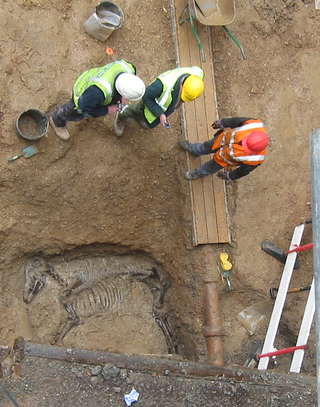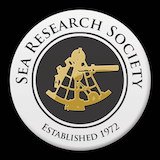The International Council on Monuments and Sites is a professional association that works for the conservation and protection of cultural heritage places around the world. Now headquartered in Charenton-le-Pont, France, ICOMOS was founded in 1965 in Warsaw as a result of the Venice Charter of 1964 and offers advice to UNESCO on World Heritage Sites.

Philip Harding DL FSA is a British field archaeologist. He became a familiar face on the Channel 4 television series Time Team.

Rescue archaeology, sometimes called commercial archaeology, preventive archaeology, salvage archaeology, contract archaeology, developer-funded archaeology or compliance archaeology, is state-sanctioned, archaeological survey and excavation carried out in advance of construction or other land development. Other causes for salvage digs can be looting and illegal construction. One effect of rescue archaeology is that it diverts resources and impacts pre-planned archaeological work.
The Council for British Archaeology (CBA) is an educational charity established in 1944 in the UK. It works to involve people in archaeology and to promote the appreciation and care of the historic environment for the benefit of present and future generations. It achieves this by promoting research, conservation and education, and by widening access to archaeology through effective communication and participation.
In British archaeology a watching brief is a method of preserving archaeological remains by record in the face of development threat. An archaeologist is employed by the developer to monitor the excavation of foundation and service trenches, landscaping and any other intrusive work the developer undertakes to give the archaeologist sufficient time to identify and record any archaeological finds and features; however, the arrangement is rarely satisfactory for either party.

Prehistoric archaeology is a subfield of archaeology, which deals specifically with artefacts, civilisations and other materials from societies that existed before any form of writing system or historical record. Often the field focuses on ages such as the Stone Age, Bronze Age and Iron Age, although it also encompasses periods such as the Neolithic. The study of prehistoric archaeology reflects the cultural concerns of modern society by showing interpretations of time between economic growth and political stability. It is related to other disciplines such as geology, biology, anthropology, historiography and palaeontology, although there are noticeable differences between the subjects they all broadly study to understand; the past, either organic or inorganic or the lives of humans. Prehistoric archaeology is also sometimes termed as anthropological archaeology because of its indirect traces with complex patterns.

The Chartered Institute for Archaeologists (CIfA) is a professional organisation for archaeologists working in the United Kingdom and overseas. It was founded in 1982, and at 21 July 2020 had 3,931 members overall, of whom 3,033 were accredited professionals; it also has 80 accredited organisations.

In archaeology, survey or field survey is a type of field research by which archaeologists search for archaeological sites and collect information about the location, distribution and organization of past human cultures across a large area. Archaeologists conduct surveys to search for particular archaeological sites or kinds of sites, to detect patterns in the distribution of material culture over regions, to make generalizations or test hypotheses about past cultures, and to assess the risks that development projects will have adverse impacts on archaeological heritage. The surveys may be: (a) intrusive or non-intrusive, depending on the needs of the survey team and; (b) extensive or intensive, depending on the types of research questions being asked of the landscape in question. Surveys can be a practical way to decide whether or not to carry out an excavation, but may also be ends in themselves, as they produce important information about past human activities in a regional context.

The Archaeological Institute of America (AIA) is North America's oldest society and largest organization devoted to the world of archaeology. AIA professionals have carried out archaeological fieldwork around the world and AIA has established research centers and schools in seven countries. As of 2019, the society had more than 6,100 members and more than 100 affiliated local societies in the United States and overseas. AIA members include professional archaeologists and members of the public.
The Valletta Treaty (formally the European Convention on the Protection of the Archaeological Heritage (Revised), also known as the Malta Convention) is a multilateral treaty of the Council of Europe. The 1992 treaty aims to protect the European archaeological heritage "as a source of European collective memory and as an instrument for historical and scientific study". All remains and objects and any other traces of humankind from past times are considered to be elements of the archaeological heritage. The archaeological heritage shall include structures, constructions, groups of buildings, developed sites, moveable objects, monuments of other kinds as well as their context, whether situated on land or under water." (Art. 1)

John Gater is a British archaeological geophysicist who featured regularly on the Channel 4 archaeological television series Time Team.

Community archaeology is archaeology by the people for the people. The field is also known as public archaeology. There is debate about whether the terms are interchangeable; some believe that community archaeology is but one form of public archaeology, which can include many other modes of practice, in addition to what is described here. The design, goals, involved communities, and methods in community archaeology projects vary greatly, but there are two general aspects found in all community archaeology projects. First, community archaeology involves communities "in the planning and carrying out of research projects that are of direct interest to them". Second, community archaeologists generally believe they are making an altruistic difference. Many scholars on the subject have argued that community collaboration does not have a pre-set method to follow. Although not found in every project, there are a number of recurring purposes and goals in community archaeology. Similarities are also found in different countries and regions—due to commonalities in archaeological communities, laws, institutions, and types of communities. It has also been suggested that public archaeology can be defined in a broad sense as the production and consumption of archaeological "commodities".

The Sea Research Society (SRS) is a non-profit organization promoting research and education in marine science and history. Founded in 1972 by underwater archaeologist E. Lee Spence, SRS undertakes archival research and underwater expeditions in search of historic shipwrecks. From 1972 to 1978, it also operated the College of Marine Arts.

George Fletcher Bass was an American archaeologist. An early practitioner of underwater archaeology, he co-directed the first expedition to entirely excavate an ancient shipwreck at Cape Gelidonya in 1960 and founded the Institute of Nautical Archaeology in 1972.
Peter Hinton is a British archaeologist and the current Chief Executive of the Chartered Institute for Archaeologists. Before working for the IfA he worked for the Museum of London Archaeology Service originally as a volunteer field archaeologist and eventually specialising as a post excavation manager. He started working for the IfA in 1997 after being actively involved since 1987. He was elected a Fellow of the Society of Antiquaries on 10 October 2003, he is also a Fellow of the Society of Antiquaries of Scotland.
Denver Fred Wendorf was an American archaeologist known primarily for his groundbreaking research in northeast Africa. He also founded the Fort Burgwin Research Center and Department of Anthropology at Southern Methodist University, where he was Henderson-Morrison Professor of Prehistory. He won numerous awards throughout his career and was a member of the United States National Academy of Sciences.

Archaeology or archeology is the study of human activity through the recovery and analysis of material culture. The archaeological record consists of artifacts, architecture, biofacts or ecofacts, sites, and cultural landscapes. Archaeology can be considered both a social science and a branch of the humanities. It is usually considered an independent academic discipline, but may also be classified as part of anthropology, history or geography.

Tall al-’Umayri is an archaeological dig site in western Jordan that dates from the Early Bronze Age to the Hellenistic period. It is located near the modern capital of Amman, and is significant for its well-preserved evidence of a temple, as well as archaeological evidence of a network of small farms believed to produce wine. Excavations were proceeding as of 2014.

DigVentures is a social enterprise organising crowdfunded archaeological excavation experiences. It is registered with the Chartered Institute for Archaeologists (CIfA), and is a CIfA Accredited Field School.
The Register of Professional Archaeologists (RPA) is a professional organization of archaeologists headquartered in Baltimore, MD. Members of the RPA agree to follow a standard code of research ethics and conduct and must be formally approved for membership by a panel of elected colleagues. Similar to organizations elsewhere, such as the Chartered Institute for Archaeologists or Australian Association of Consulting Archaeologists, the Register is a mechanism for enforcing archaeological standards, particularly among the large numbers working in cultural resources management.
NOTE:{Archaeologist are the people who studied science and found the architecture}












